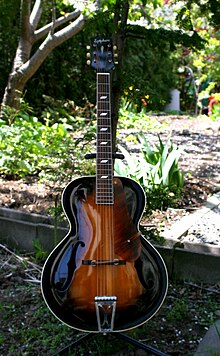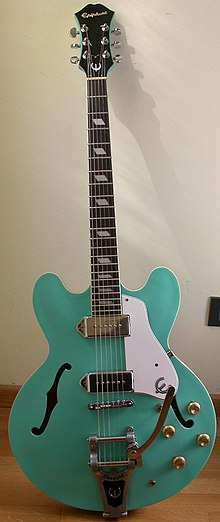Epiphone: Difference between revisions
m robot Removing: he:Epiphone |
|||
| Line 127: | Line 127: | ||
* Epiphone T-310 |
* Epiphone T-310 |
||
* Epiphone Sorrento |
* Epiphone Sorrento |
||
* Epiphone Scroll (three models) |
|||
==Players Of Epiphone== |
==Players Of Epiphone== |
||
Revision as of 15:03, 28 August 2008

The Epiphone Company is a musical instrument manufacturer founded in 1873 by Anastasios Stathopoulos. Before being bought out by Gibson in the late 1950s, Epiphone was Gibson's main rival in the archtop market. Their professional archtops, including the Emperor, Deluxe, Broadway and Triumph, rivaled (and some contend surpassed) those of Gibson. Aside from their guitars, Epiphone also made bass guitars, banjos, and other stringed instruments. However, the company's weakness in the aftermath of World War II allowed Gibson to absorb it.
The name "Epiphone" is a combination of proprietor Epaminondas Stathopoulo's nickname "Epi" and "phone", Greek for "sound".
History

The history of Epiphone dates to the 1870s, in Izmir, Ottoman Empire, where Greek founder Anastasios Stathopoulos made his own fiddles, lutes, and Lioutos. Stathopoulos moved to the United States of America in 1903, and continued to make his original instruments, as well as mandolins, from Long Island City in Queens, New York. Anastasios died in 1915, and his son, Epaminondas, took over. After two years, the company was known as The House Of Stathopoulos. Just after the end of World War I, the company started to make banjos. The company produced its Recording Line of Banjos in 1924, and, four years later, took on the name of the "Epiphone Banjo Company". They produced their first guitars in 1928. Epi Stathopoulos died in 1943. Control of the company went to his brothers, Orphie and Frixo. Unfortunately, they were not as capable owners as Epi. In 1951, a four month long strike forced a relocation of Epiphone from New York to Philadelphia. The company was bought out by their main rival, Gibson in 1957.
Casino
The most famous Epiphone model introduced by Gibson after taking over was the Casino. The Casino was made in the same shape and configuration as a Gibson ES-330 guitar. It has a very heavy sound and is a very good rhythm guitar due to its fairly thick sound when strummed. It is a genuine hollow body electric guitar with P90 pickups.

The Casino is famous for being used by The Beatles. Paul McCartney was the first to acquire one and John Lennon and George Harrison followed suit soon after. Paul McCartney used his for the solo in Taxman and the Casino sound is very prevalent throughout Revolver and their later albums. John Lennon made his Casino one of his main guitars and used it for the rest of his time with the Beatles and into the 70s. Paul still uses his Casino in concert and studio today.
1970-present
In the early 1970s, Epiphone began to manufacture instruments in Japan. From the 1980s, Epiphones were manufactured mainly in Korea but also in Japan by contractors licensed by Gibson. One of these contractors was Samick, which also built instruments under license for other brands and in its own name. Thus, a Korean-era solidbody Epiphone would have been built under license. The brand was primarily used to issue less expensive versions of classic Gibson models, in a manner similar to that of the Squier brand by Fender. These Epiphones were sometimes built with different tonewoods from the original Gibson versions, which often resulted in the instruments bearing a visual and ergonomic similarity to the Gibson originals but having a slightly different tone. For example, bodies of the G-400 SG copy were made with either mahogany or alder body, depending on the availability of the wood.
Samick has stopped manufacturing guitars in Korea. In 2002, Gibson opened a factory in Qingdao, China, which manufactures Epiphone guitars and no others.
Unique Epiphone models, including the Emperor, Zephyr, Riviera and Sheraton, are built to higher quality standards than the company's "Gibson copy" line. Epiphone also produces a range of higher quality instruments under the "Elitist Series" moniker, which are built in Japan. The "Masterbilt" acoustics are manufactured in Qingdao.
According to several forum entries, current Epiphone serial numbers give the following information:
Korea
- I = Saein
- U = Unsung
- S = Samick
- P or R = Peerless
- K = Korea
China
- DW = DeaWon
- EA = Gibson/QingDao
- EE = Gibson/QingDao
- MC = Muse
- SJ = SaeJung
- Z = Zaozhuang Saehan
- BW = China
Japan
- No letter or F = FujiGen
- J or T = Terada
Czech Republic
- B = Bohêmia Musico-Delicia
Indonesia
- SI = Samick
Example: U8034853 U = Unsung, 8 = 1998, 03 = March, 4853 = manufacturing number.
At least one model, the Epiphone Spirit, was manufactured in the USA during the early 1980s in the Gibson factory in Kalamazoo, MI. USA produced Epiphones of this era bear standard Gibson serialization and include the "Made in USA" stamp on the back of the headstock. Headstocks of US models also use the Gibson headstock shape.
Current status
Epiphone is now a subsidiary of Gibson, somewhat like Squier is a subsidiary of Fender (the chief difference being that the Squier line of guitars was created in-house by Fender; in other words, there is no such thing as a "pre-Fender" Squier guitar). Because of this subsidiary relationship, many of the instruments look the same as the more expensive Gibson versions. However Epiphone still maintains its own line of archtop guitars.
Epiphone also manufactures its own line of amplifiers.
Current products
Amplifiers
Gibson produced Epiphone amplifiers in the 1960s which were basically copies or variations of Gibson and Fender amplifiers. These amplifiers were of a tube design and some had reverb and tremolo. Gibson decided to launch a new line of Epiphone amplifiers in 2005 with many different models including the "So Cal", "Blues Custom" and the Epiphone Valve Junior.
Guitars
The following guitars are currently made by Epiphone:
Gibson copies

- The Explorer
- Several Versions of the SG guitar Including G400, G310 and SG Special.
- Around 20 versions of the Les Paul
- The Dot (and the Dot Studio), similar to the ES-335
- The Flying-V
- The Firebird
- The Thunderbird
- Les Paul Jr.
- The Blackbird
- The ES-175
- The ES-295
- The EDS-1275 Dual-neck
- The Hummingbird
- The LP-100
Dedicated Epiphone models
- Several versions of the Sheraton
- Several versions of the Casino
- The Riviera in 6- and 12-string versions
- The Broadway
- The Emperor Regent
- Several versions of the Zephyr:
- Zephyr Blues Deluxe
- Zephyr Regent
- The Supernova
- The Wildkat
- The AlleyKat
- The Flamekat
- Nick Valensi Riviera P-94
- The Viola Bass
- The Coronet
In recent years Epiphone introduced a series of acoustic guitars named Masterbilt after a line of guitars of the 1930s. Today's Masterbilt guitars are manufactured in China.
Discontinued Models
- Epiphone Demon
- Epiphone Genesis
- Epiphone Slasher
- Epiphone Supernova
- Gibson/Epiphone Spirit
- Various Signature models
- Epiphone Wilshire
- Epiphone Crestwood
- Epiphone Coronet
- Epiphone Olympic
- Epiphone Pro
- Epiphone Fat-210
- Epiphone Fat-310
- Epiphone T-310
- Epiphone Sorrento
- Epiphone Scroll (three models)
Players Of Epiphone
Elitist
Epiphone has recently released a new brand, called Elitist. These are made in Japan, unlike Gibson guitars, but the specific parts of the guitars are made in other countries, such as Germany. These guitars naturally cost more, sometimes twice as much. Standard Epiphone and Gibson guitars have an open-book looking headstock, but Elitist models have a more curved style.
References
- "Epiphone History". Retrieved 2008-03-19.
